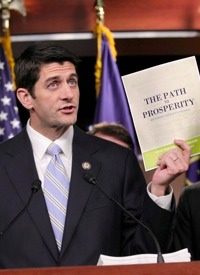
Though the Left has not missed a beat, immediately attacking Representative Paul Ryan’s proposal to overhaul Medicare, Fox News reports that “the basic details of the plan are not so far off from several other healthcare systems — including the coverage provided to members of Congress, the Medicare Advantage program and the so-called health insurance exchanges established under the Democrats’ federal healthcare system overhaul.”
Ryan’s Medicare plan is part of his larger 2012 budget proposal. As Chairman of the House Budget Committee, Ryan outlined the framework for his proposal on Fox News Sunday. According to the congressman, seniors would still get a fixed subsidy from the government to help pay for premiums, but under his proposal, it would come from a private health plan of their choosing. Medicare would send the subsidies to the private plans, which would necessarily “compete against each other.”
The proposal forces seniors to pay more for smaller expenses but in the end caps what can be paid out of pocket, setting a flat $600 deductible and the cap at $6,000.
Ryan contends that the plan is similar to that of Medicare Advantage, where seniors are permitted to put their money toward private plans.
Likewise, as observed by Fox News:
The framework also bares [sic] similarities to the exchanges in the federal healthcare overhaul.
Both proposals presumably would put out a list of approved private health plans and subsidize the policies chosen by patients.
When a reporter asked Ryan to address the similarities, he responded, “Exchange is not necessarily a dirty word.” He added, however, that the exchange is different between the Republican plan and that of Obama.
Fox News explains:
The differences may lie in implementation. Whereas the federal healthcare overhaul sets strict standards for the types of plans that would be allowed to compete for subsidized patients’ business, the Center on Budget and Policy Priorities cautioned last month that the Ryan-Rivlin proposal "sets no specific benefit standards" for private plans.
One key difference between the two exchanges is the way the subsidies are calculated. Under the Ryan-Rivlin proposal, the subsidy would be based on the average cost per Medicare patient in 2012 — and then allowed to increase at the rate of GDP growth plus 1 percent. Under the healthcare overhaul, subsidies would be based on a calculation that factors in market prices and the income of the individual.
Ryan also hinted at the possibility of adding a sliding scale for Medicare benefits. On Fox News Sunday, he said that the plan “would give more for the poor, more for people who get sick, and we don’t give as much money to people who are wealthy.”
President of the National Center for Policy Analysis John C. Goodman said he believes Ryan’s plan to entail less strict criteria than the federal exchanges that “virtually dictate” to insurance companies what they must provide.
“There’s going to be choice in both worlds…That’s similar,” said Goodman. “It’s not radical. It’s not even that new.”
Goodman went on to praise Ryan’s plan and suggested that it should be used as a model for the eventual exchanges under the health care overhaul.
The Tax Policy Center contends that the healthcare overhaul lays the groundwork for Paul’s plan, as it sets up an individual mandate and an exchange, and establishes minimum standards for insurance plans.
“Additional premium support for seniors would be the final piece of the puzzle,” explains Tax Policy Center fellow Howard Gleckman. “Seniors would be able to buy affordable private coverage through the same sort of exchanges as tens of millions of working people…the idea is not as radical as it sounds.”
Critics of the plan claim that Ryan’s budget proposal provides “taxpayer giveaways” to the oil companies at the expense of seniors.
Democratic Representative Chris Van Hollen observed,
This is a huge change in Medicare. Not only does it cut the amount for Medicare but it ends the current guarantee that seniors have under Medicare to certain health benefits. And it essentially transfers all the risk of rising healthcare costs over to the senior.
Though critics complain that seniors will in fact have to pay more under Ryan’s plan, Ryan declares, “Doing that saves Medicare.”
Likewise, Mike Needham of Heritage Action for America states, “What we have now is a Medicare system that’s going bankrupt. The most important thing is saving Medicare for future generations.”
Photo: House Budget Committee Chairman Paul Ryan, R-Wis. displays his 2012 federal budget during a news conference on Capitol Hill in Washington, April 5, 2011.




